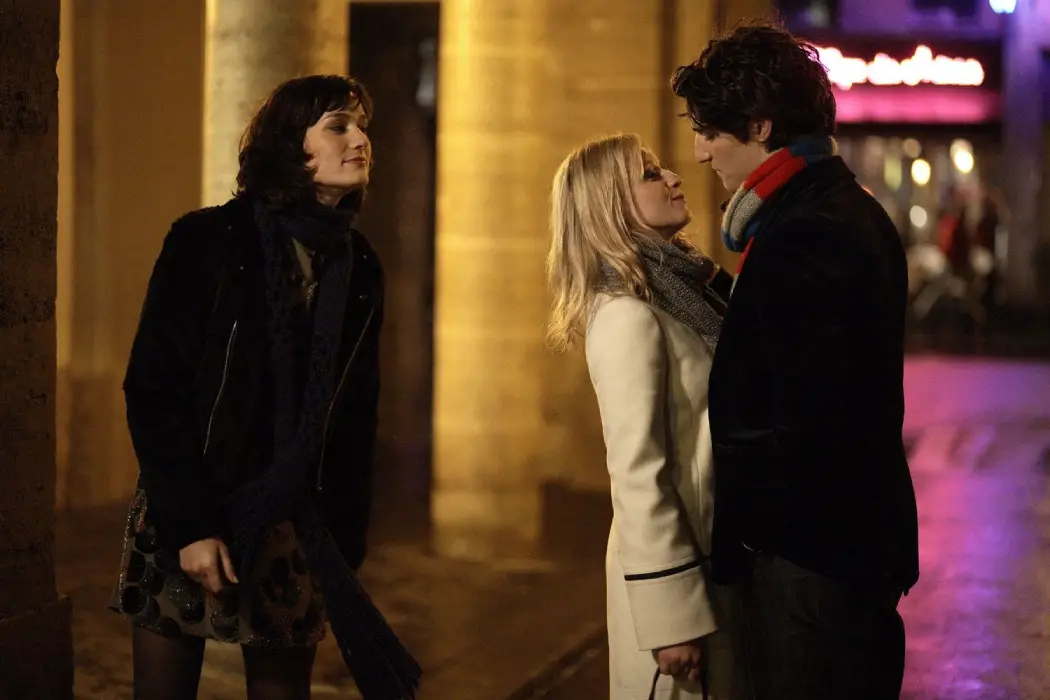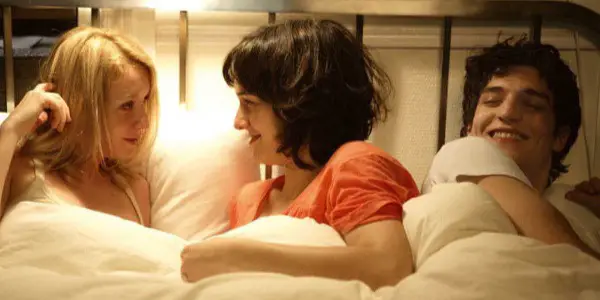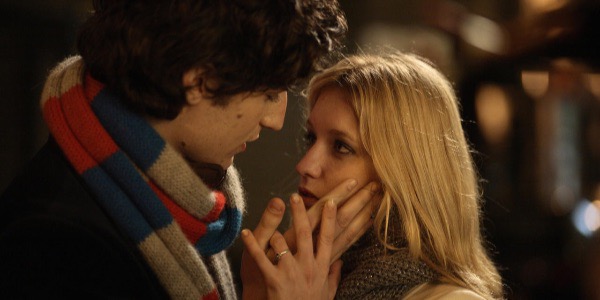Queerly Ever After #50: LOVE SONGS (2007)

Amanda Jane Stern is an actress, writer, and director from…
Queerly Ever After is a bi-monthly column where I take a look at LGBT+ films that gave their characters a romantic happily-ever-after. There will be spoilers. Also, don’t forget to buy your Queerly Ever After merch right here.
For my 50th entry in this column, I am writing about a movie that means a lot to me: Christophe Honoré‘s Love Songs (Les Chansons D’Amour). Love Songs is a movie-musical in the style of French New Wave classics like The Umbrellas of Cherbourg. It follows young couple Ismaël (Louis Garrel) and Julie (Ludivine Sagnier). Together for over a decade, their relationship is starting to fray and, in an effort to bring new life to it, Julie invites Alice (Clotilde Hesme) to become their third. However, bringing a new person into their bed, while exciting at first, proves too much for the pair, and Julie tells Ismaël to choose Alice or her.

Then, tragedy strikes. While the three are out at a concert Julie starts to feel ill. She suddenly collapses and paramedics are unable to revive her. Leaving Ismaël and Alice to figure out how to grieve her untimely death. Alice throws herself into her work and begins a new relationship with Gwendal (Yannick Renier), but Ismaël falls into a deep depression. He tries to maintain his close relationship with Julie’s family, who always loved him as if he were their own son, but finds it hard to spend so much time with them now that she is gone. Matters are only made more complicated by Julie’s older sister, Jeanne (Chiara Mastroianni), who, out of an attempt to not only understand her sister’s life before she died and to also remain close to her memory, tries to strike up a relationship out of grief with Ismaël.

One night, when Ismaël allows Jeanne to stay over at his apartment, he seeks refuge with Alice. Alice invites him to stay on Gwendal’s couch for the night. There, he meets Gwendal’s younger brother Erwann (Grégoire Leprince-Ringuet). Erwann immediately takes a shine to Ismaël and begins to pursue a relationship with him, but Ismaël is reluctant to be with Erwann. His reluctance to a relationship with Erwann is not because Erwann is a guy, but because he’s afraid to fall in love with someone else and open himself up to the possibility of getting hurt again.
Everyone is Bi
I discovered this movie my sophomore year of high school, and I became obsessed with it pretty quickly. I don’t think I can count how many times I have watched it. The chorus from the ending song was, for years, my ringtone and my alarm clock. I’ve often thought of getting the movie’s final quote as a tattoo. Looking back now, and unpacking just what it was that drew me to this movie, it was likely the fact that pretty much all the characters were bisexual. It was never an issue, the drama didn’t stem from their sexuality but from their grief at losing someone they loved. Movies that depicted sexuality as something that could be fluid and not an issue were few and far between in the early oughts. Unfortunately, they still are in many cases. European, especially French films, have been exploring fluid sexuality on screen for a lot longer than we have in the States.

Unfortunately, biphobia was de rigueur during my teen years. The first time I heard someone say they were bisexual was my summer going into sixth grade, and that’s only because I went to a performing arts sleepaway camp. And yet, even at a place that hosted an annual Rocky Horror Picture Show night, campers coming out as bi were often met with derogatory comments such as “oh, he’s really just gay and doesn’t want to admit it” for guys, and “she’s just saying that to attract guys” for gals. Understandably, I kept quiet about my own sexuality for years. Finding this movie in my sophomore year of high school, which happened to be a pivotal year for me for a host of reasons, was groundbreaking. And, even though it still took me years to come out as bisexual, having this movie as something I could turn to, thanks to the Sundance Channel frequently playing it, was a huge help in my own self-acceptance.
In Conclusion: Love Songs
Obviously, you already know by the end of the film, Ismaël and Erwann do end up together, with Ismaël realizing that although he is still afraid of losing someone else he loves, that is not a reason to close himself off to love. Does the movie have its flaws? Of course, it does, but I can’t separate what the movie was from me and look at it on a purely objective basis. And that’s ok, after all, movies are made to make you think, to make you feel something, very often in cases of queer films, the filmmaker is trying to reach out to the audience, to let them know they are seen, they are real, their identity is valid.
Love Songs came out in the UK on December 14, 2007 and March 21, 2008 in the USA. For all other release dates, see here.
Watch Love Songs
Does content like this matter to you?
Become a Member and support film journalism. Unlock access to all of Film Inquiry`s great articles. Join a community of like-minded readers who are passionate about cinema - get access to our private members Network, give back to independent filmmakers, and more.
Amanda Jane Stern is an actress, writer, and director from New York City. She received her BA in Film, Television & Interactive Media and Theater Arts from Brandeis University. She loves regaling whomever will listen with her endless lists of fun facts and knowledge of film history. Follow her on twitter and instagram @amandajanestern













